Workplace well-being has quite rightly become a hot topic for IT professionals and for IT service management (ITSM) in particular. While the IT service desk, and its people, is an obvious area for concern, workplace well-being issues can affect all of us no matter our role. For example, my own well-being issues, which I wrote about in Mental Health and Well-being in IT – a Personal Account, came to a head while I was in a product management role. But this article isn’t about me, it’s about you and the million-plus people who work in ITSM roles (I’ve cheekily based this on ITIL certification numbers) who might at some point be struggling with workplace well-being issues whether they know it or not.
With this in mind, a month ago, we launched an anonymous ITSM.tools survey via this article: Well-being in ITSM – How Big is the Issue? We promoted it using Twitter, Facebook, and LinkedIn and hoped for the best. We’d have loved to get 300+ responses, as per our Future of ITSM surveys, but we realistically knew that 100+ responses would be the point at which to collate and analyze the results.
Research from @ITSM_tools finds that 86% of survey respondents think that working in IT is going to get harder in the next three years. #ITSM #mentalhealth #wellbeing Share on XThe survey asked five questions, of which three were replicated from our Future of ITSM 2019 survey in Q1 2019 to enable us to see if there were any significant changes. Although, we can’t promise the same selection of people participated in both surveys; but alas that’s the nature of these types of surveys.
Anyway, please read on to find out what our survey results said.
Summary results
For those of you who are short of time, the key findings are that:
- 86% of survey respondents think that working in IT is going to get harder in the next three years (at least for some roles). With only 9% thinking not.
- 35% of the survey sample feel that their personal efforts aren’t recognized, and another 48% state that it sometimes happens but not enough – equalling a total of 83% of survey respondents feeling undervalued in their jobs. Leaving only 17% of respondents that feel valued.
- 71% of survey respondents state that working in IT has adversely affected their well-being to some extent. 21% considerably – which sounds worse when stated as one in every five people.
- 43% of survey respondents feel that their immediate manager is not suitably skilled to identify and deal with employee well-being issues. Another 32% think that they’re only partially skilled. Which is three-quarters of immediate managers.
- 37% of survey respondents feel that their employer doesn’t have suitable mechanisms for preventing and helping with employee well-being issues. Another 34% that they need improving. Which is again close to three-quarters of companies.
Please keep on reading if you want to better understand the detail…
83% of #ITSM #wellbeing survey respondents feel undervalued in their jobs. Get the full set of results here. Share on XQ1. Working in IT
The first survey question asked:
Do you think working in corporate IT will get harder over the next three years?
The results are shown in the graph below.
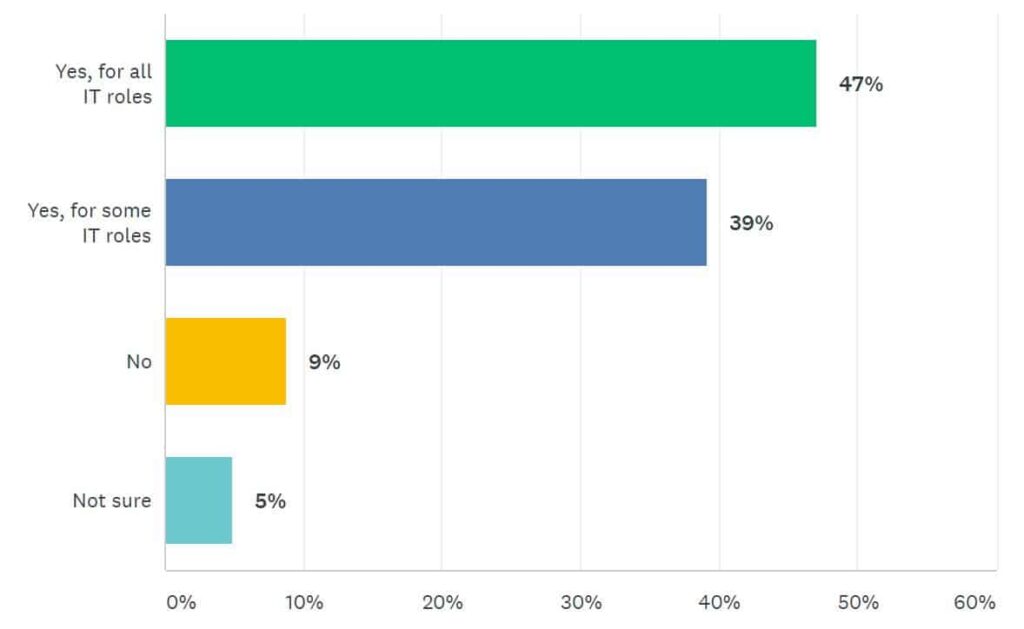
So, the survey shows that 86% of survey respondents think that working in IT is going to get harder (at least for some roles). With only 9% thinking not. This compares to 84% and 13% respectively in the Future of ITSM 2019 survey.
However, what’s noticeably different between the surveys is the split for the two “Yes” options – with an extra 16% of respondents thinking that working in IT will get harder for all roles:
| Answer Options | Wellbeing Survey | Future of ITSM Survey |
|---|---|---|
| Yes, for all IT roles | 47% | 31% |
| Yes, for some IT roles | 39% | 53% |
We’re therefore looking at an ITSM workforce that’s expecting things to get worse for those who are “working in IT.” This doesn’t bode well for workplace well-being.
Q2. Being personally recognized
The second question asked:
Do you feel your personal efforts, and your value to the business, are sufficiently recognized by management?
The results are shown in the graph below.
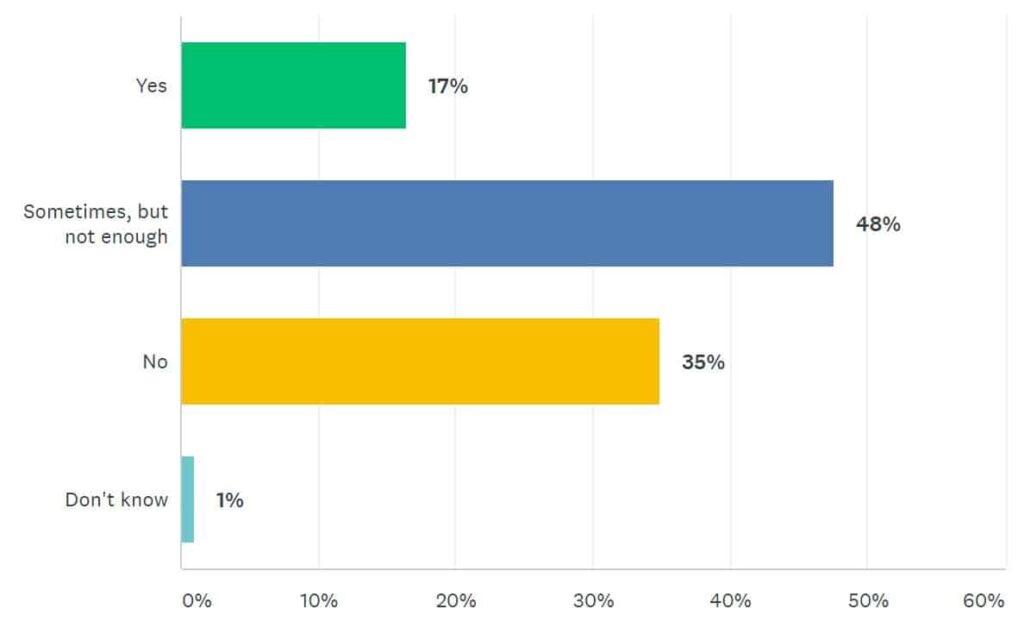
As per the yellow bar, 35% of the survey sample feel as though their personal efforts and value aren’t recognized, and another 48% stated that recognition sometimes happens but not enough – giving a total of 83%. And, as per the green bar, only 17% of respondents feel valued.
Worrying survey results from @ITSM_tools show that a massive 83% of survey respondents feel undervalued in their jobs. #wellbeing #ITSM Share on XLooking at the results across surveys again, the early-2019 Future of ITSM survey reported 72% and 25% respectively – so, we have a more negative situation as we end 2019.
| Answer Options | Wellbeing Survey | Future of ITSM Survey |
|---|---|---|
| Yes | 17% | 25% |
| Sometimes, but not enough | 48% | 41% |
| No | 35% | 31% |
| Don't Know | 1% | 3% |
Q3. Workplace Well-being
The third question asked:
Do you feel that working in IT is adversely affecting your personal well-being?
The results are shown in the graph below.
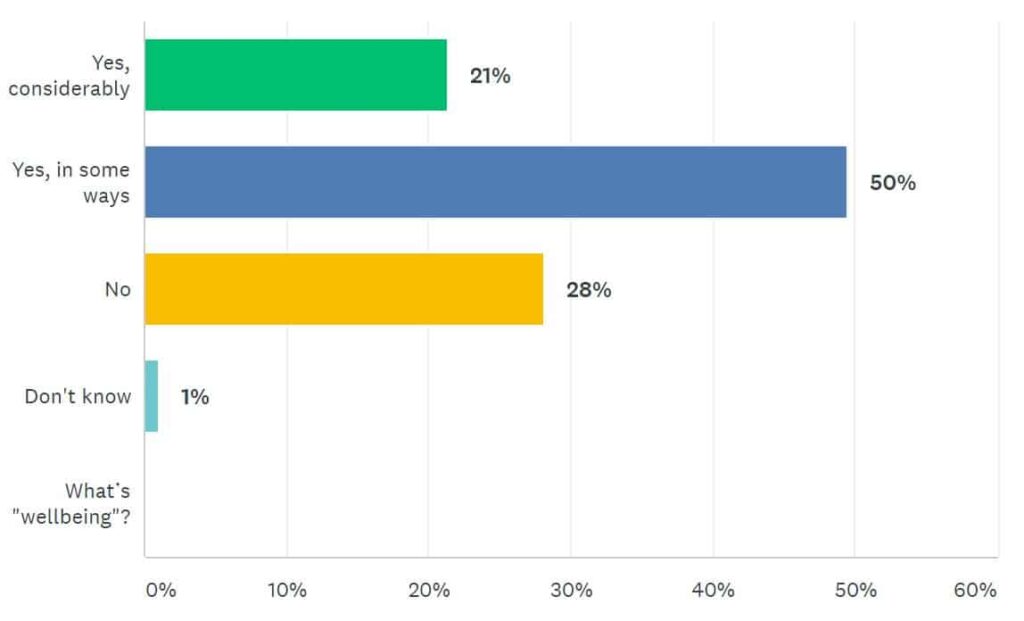
As per the green and blue bars, 71% of survey respondents state that working in IT has adversely affected their well-being to some extent. Whereas 28% have experienced no issues.
When the two affirmative options are compared to the Future of ITSM 2019 survey, there’s a collective rise of 16% from 55% to 71%, of which 9% is a move from “No” responses and 7% from “Don’t know” responses.
71% of #ITSM survey respondents state that working in IT has adversely affected their #wellbeing to some extent. #mentalhealth Share on XSo, even if you take a more prudent view of these survey results, I still feel confident in stating that three of every five people working in ITSM roles have suffered from some form of well-being-related issues. Which is pretty scary.
| Answer Options | Wellbeing Survey | Future of ITSM Survey |
|---|---|---|
| Yes, considerably | 21% | 10% |
| Yes, in some ways | 50% | 45% |
| No | 28% | 37% |
| Don't Know | 1% | 8% |
Q4. Line management workplace well-being capabilities
The fourth question asked:
Do you think that your immediate manager is suitably skilled to identify and deal with employee well-being issues?
This was the first new question and the results are shown in the graph below.
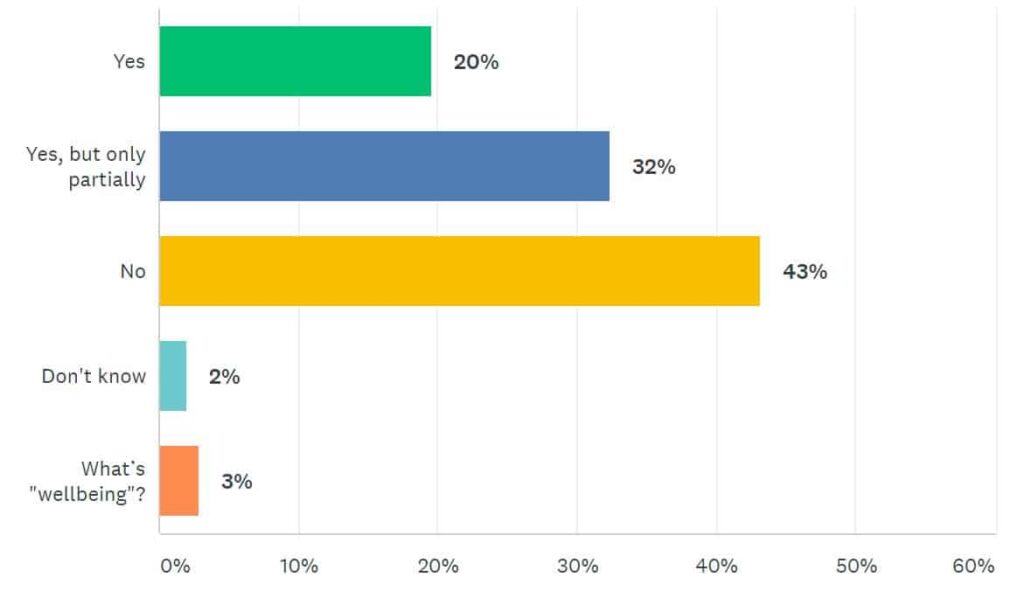
As shown by the yellow bar, a worrying 43% of survey respondents feel that their immediate manager is not suitably skilled to identify and deal with workplace well-being issues. And another 32% that they’re only partially skilled. 20% feel that they are. Oddly, 3% selected “What’s well-being?” as their response. Thus, potentially three-quarters of line managers aren’t suitably equipped to identify and deal with employee well-being issues (or at least haven’t been able to demonstrate these capabilities to their staff).
Further analysis will be conducted to see how this question correlates to the other questions. However, the 20% for “yes” is already lower than the 28% of respondents that haven’t experienced workplace well-being issues in question 3.
Q5. Organizational workplace well-being capabilities
The fifth and final question asked:
Does your organization have suitable mechanisms for preventing and helping with employee well-being issues?
The results are shown in the graph below.
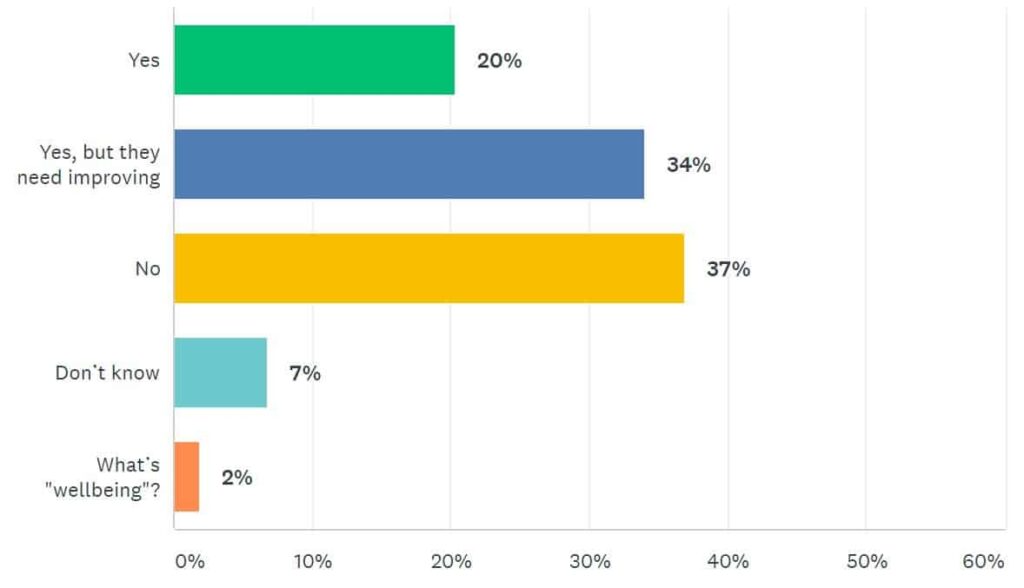
The results are very similar to the previous question related to immediate managers being suitably skilled to identify and deal with employee well-being issues. This is pretty unsurprising given that much of what a good line manager needs for dealing with employee issues – well-being-related or otherwise – is at least in part provided by fit-for-purpose organizational capabilities, from management training to access to expert resources.
So, 37% of survey respondents feel that their employer doesn’t have suitable mechanisms for preventing and helping with workplace well-being issues. And another 34%, that they need improving. Whereas 20% feel that they’re fit-for-purpose. Thus, again, potentially close to three-quarters of employers aren’t suitably equipped for dealing with employee workplace well-being issues.
ITSM well-being survey finds that potentially close to three-quarters of employers aren’t suitably equipped for dealing with employee #wellbeing issues. #ITSM Share on XWhat it all means for workplace well-being
Despite the fact that we’d have liked more survey responses, and the fact that all surveys are subject to “survey bias,” I still think that the survey results are evidence of a worsening workplace environment, and personal well-being, for people in ITSM roles. It has many ramifications, from the very human view that we all deserve to be happy in our work. Through to the more-corporate issues (and I’m not saying unhappy employees is not a corporate issue) such as the resulting sickness, retention, and productivity levels and the adverse effect these have on business performance. With the latter magnified when you consider that IT support staff issues will also be affecting the productivity levels of the employees they serve.
My additional analysis related to the correlations between the different questions will hopefully shine more light on what’s happening. For instance, in the Future of ITSM 2019 report, we found that there’s a strong correlation between the lack of employee recognition and workplace well-being issues. Please lookout for this analysis in a future ITSM.tools article.
New research finds that three of every five people working in #ITSM roles have suffered from some form of well-being-related issues. #wellbeing #mentalhealth Share on XSo, what’s the ITSM industry going to do about all of this?
People-related issues have traditionally been “tough nuts to crack.” In part due to the lack of attention that people have persistently received in the ITSM triumvirate of “people, processes, and technology.”
Will it be a case of action finally being taken after the proverbial “horse has bolted” – because the ability to deliver corporate IT and business services is severely impeded by recruitment issues? Or, will an industry that’s wisely waking up to the fact that the employee experience, and the levels of lost productivity, caused by suboptimal service and support capabilities is an important area for ITSM improvement as we race into 2020 and beyond?
I’m hoping for the latter, but I’m also not holding my breath.
How does your organization view workplace well-being? Do you think it has an issue? Do you think ITSM as a whole has an even bigger issue? Please let me know in the comments.
If you liked this workplace well-being article, the following articles might be helpful too.
Stephen Mann
Principal Analyst and Content Director at the ITSM-focused industry analyst firm ITSM.tools. Also an independent IT and IT service management marketing content creator, and a frequent blogger, writer, and presenter on the challenges and opportunities for IT service management professionals.
Previously held positions in IT research and analysis (at IT industry analyst firms Ovum and Forrester and the UK Post Office), IT service management consultancy, enterprise IT service desk and IT service management, IT asset management, innovation and creativity facilitation, project management, finance consultancy, internal audit, and product marketing for a SaaS IT service management technology vendor.

